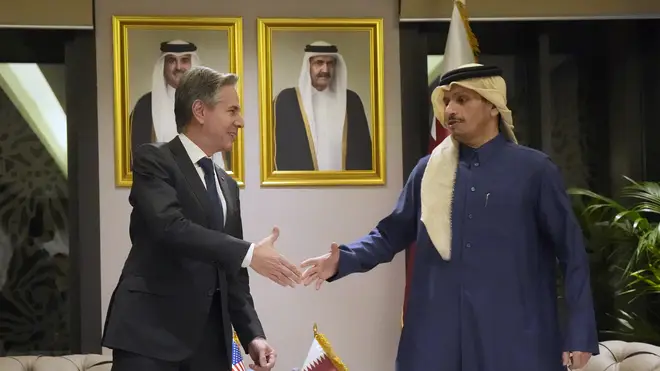
James O'Brien 10am - 1pm
7 February 2024, 05:14

Sheikh Mohammed bin Abdulrahman Al Thani shared his assessment on Tuesday at a news conference with visiting US Secretary of State Antony Blinken.
Qatar’s prime minister says Hamas’s reaction to the latest Gaza ceasefire plan has been “generally positive”.
Sheikh Mohammed bin Abdulrahman Al Thani shared his assessment on Tuesday at a news conference with visiting US Secretary of State Antony Blinken.
Qatar, which has long mediated with Hamas, has been working with the US and Egypt to broker a ceasefire that would involve an extended halt in fighting and the release of the over 100 hostages still held by Hamas after its October 7 cross-border raid that ignited the war nearly four months ago.
The Qatari prime minister did not provide any details on Hamas’s response but said the group had “comments”.
Hamas said in a statement that it responded in a “positive spirit” to the latest proposal from the US and Middle East mediators. But the militant group said it still seeks “a comprehensive and complete” ceasefire to end “the aggression against our people”.
Israel has ruled out the kind of permanent ceasefire sought by the militant group.
Mr Blinken confirmed that officials had received Hamas’s response and said he would brief Israel’s leaders when he visits the country on Wednesday.
Mr Blinken met Egyptian officials earlier in the day and was in Saudi Arabia on Monday.

His visit also comes amid growing concerns in Egypt about Israel’s stated intentions to expand the combat in Gaza to areas on the Egyptian border that are crammed with displaced Palestinians.
Israel’s defence minister has said his country’s offensive will eventually reach the town of Rafah, on the Egyptian border, where more than half of Gaza’s 2.3 million people have sought refuge and are now living in increasingly miserable conditions.
UN humanitarian monitors said on Tuesday that Israeli evacuation orders now cover two-thirds of Gaza’s territory, driving thousands more people every day toward the border areas.
Egypt has warned that an Israeli deployment along the border would threaten the peace treaty the two countries signed more than four decades ago. Egypt fears an expansion of combat to the Rafah area could push terrified Palestinian civilians across the border, a scenario Egypt has said it is determined to prevent.
Mr Blinken, who met Egyptian President Abdel-Fattah el Sissi in Cairo, has said repeatedly that Palestinians must not be forced out of Gaza.
During this trip, Mr Blinken is seeking progress on a ceasefire deal, on potential normalisation of relations between Israel and Saudi Arabia, and on preventing an escalation of regional fighting.

On all three fronts, Mr Blinken faces major challenges. Hamas and Israel are publicly at odds over key elements of a potential truce. Israel has dismissed the United States’ calls for a path to a Palestinian state, and Iran’s militant allies in the region have shown little sign of being deterred by US strikes.
Egypt and Qatar have been trying to mediate an agreement between Israel and Hamas that would lead to the release of more hostages in return for a several-week pause in Israeli military operations.
The outlines of such a deal were worked out by intelligence chiefs from the US, Egypt, Qatar and Israel late last month and were presented to Hamas.
As on his previous four trips to the Middle East since the Gaza war began, Mr Blinken’s other main goal is to prevent the conflict from spreading, a task made more difficult by stepped-up attacks by Iran-backed militias in the region and increasingly severe US military responses in Iraq, Syria, Yemen and the Red Sea that have intensified since last week.
Mr Blinken met Crown Prince Mohammed bin Salman on Monday evening, shortly after arriving in the Saudi capital, Riyadh. Saudi officials have said the kingdom is still interested in normalising relations with Israel in a potentially historic deal, but only if there is a credible plan to create a Palestinian state.
The White House on Tuesday indicated there is still “no finality” on Hamas’s position on a proposal to free remaining Israeli hostages for an extended pause in fighting.
“I would say that the negotiating effort is still ongoing,” National Security Council spokesman John Kirby said. “We aren’t at a place where we have finality on it.”